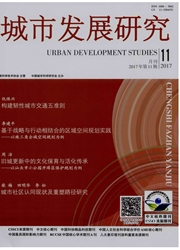

 中文摘要:
中文摘要:
乡村是我国生态文明建设的重要载体。处理好乡村人居环境建设中生态与人的关系是新时期乡村规划的工作重点,也是生态文明建设的本质需求。从生态学理念和人本主义思想的语境出发,提出生态学理念下乡村规划的三个重要层次:个体的生计层次、种群的生境层次、群落的村社层次。并以此构建乡村规划的人本主义工作逻辑:以"人地关系调查"为工作基础,构建"县—乡—村"空间协作平台;树立适应基层发展诉求、尊重村民的价值观,围绕"乡贤指导+规划引导"的价值核心;遵循"低技术、高参与、众筹智慧"的规划策略。实现乡村发展要素的统筹协调,提升人居环境建设系统的综合效能。
 英文摘要:
英文摘要:
The village is the important carrier of ecological civilization construction in our country. Deal with the relationship between ecological priorities and human in the rural living environment construction is the inherent requirements of rural planning and also essential requirements of ecological civilization construction. In this paper,starting from the context of ecology concept and humanistic thoughts,put forward rural planning under the guidance of the ecology idea contains three important levels: the livelihood planning of the villagers,village habitat planning,village development planning,and thus build the humanistic working logic of rural planning:base on " geography and conditions of the people census", " county,town,village" triple collaboration platform for planning work;adapting to grassroots development demands,respect the values of the villagers,realize core value of " follow squire and technical guidance "; abide the low technology,high participation,raise the planning strategy of wisdom,coordinate the overall,to promote the comprehensive efficiency of human settlement environment construction system.
 同期刊论文项目
同期刊论文项目
 同项目期刊论文
同项目期刊论文
 期刊信息
期刊信息
